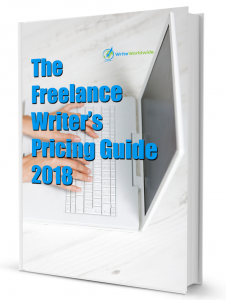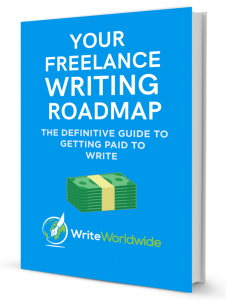Exploring these reasons – and finding your own ‘why’ – is an important step in your journey to becoming a successful freelance writer. If you have a strong core motivation, your will to succeed will be all the more powerful.
When things get tough – and they will get tough – keep your ‘why’ front of mind, and you’ll find it that much easier to power on through the obstacles in your path.
Everyone’s reasons for wanting to be a freelance writer are different, and it’s important to be clear of your own.
In this article I’ll explore some of mine – maybe they’re some of yours too. I’ll also break down my freelance writing action plan for quitting my day job and becoming a full-time freelance writer.
This is a living, breathing plan I’ve been working through for some time, so If you’re looking to quit your day job and become a full-time freelance writer, I’d love for you to follow along.
The ‘Why’
1) Location Independence
This is a huge one for me. I love to travel, and hate being tied down geographically. Freelance writing is a career that can be launched from just about anywhere – all you need is an internet connection and a computer. Maybe you’re like me and you want the freedom to travel to new places while writing for clients all around the globe.
Or maybe you’d just like to up sticks and move somewhere different. Closer to friends and family, out in the countryside, or next to the ocean.
Freelance writing opens up a world of possibilities for a change of scene. But if that’s not your cup of tea, you can choose to work from home close to the kids and the dogs, or in your favourite neighbourhood café down the street.
That’s the beauty of location independence. The choice is entirely yours.
2) Work for Yourself and Set Your Own Hours
When you work for yourself there’s a direct connection between your actions and your success. Sure, that can be scary, but isn’t it better than having a boss breathe down your neck?
Working for yourself allows you to take back the responsibility for your own success. With that comes the freedom to set your own schedule.
Are you an early bird or a night owl?
You could choose to get up at the crack of dawn and finish your work day by mid-afternoon, freeing up the rest of the day to enjoy your leisure time or pick up the kids from school.
Or, you could enjoy a late brunch and start your day in the afternoon or evening. Or even use the twilight hours to complete your projects. Again, the choice is yours.
Just remember that however you decide to do it, you’ll still need to put in a ton of hard work to make a success of your business. So treat it as just that – a business. That means (among other things) keeping track of your numbers, planning for and sticking to deadlines, keeping a regular writing routine, and marketing yourself consistently.
3) Greater Earning Potential
The possibilities here are endless. Here are just a few ways you can continue to increase your earnings as a freelance writer:
- Phase out lower paying clients
- Build on your success to dominate your niche or service and command higher rates
- Create information products to help solve clients’ problems
- Offer marketing consulting
- Build a trusted team of writers to outsource work to
- Partner with other writers or designers to offer a broader range of services at higher rates
Sound good? If you’re just starting out these ideas may seem out of reach. But if you dedicate yourself to helping your clients solve their problems and keep learning more each day there’s a world of possibility for increasing your earnings as a freelance writer.
Which of those reasons for being a freelance writer appeal to you most? If you’re anything like me, each one of them is a very powerful reason to quit the rat race.
Feeling motivated to quit your day job yet? Great! But you’re going to need a plan of action …
The Freelance Writing Action Plan

1) Build Your Foundation
Nick’s article delves into the basics of building your foundation as a freelance writer. From positioning yourself by service or niche, to setting up your writer’s website and professional email address, and building a credible online presence.
Don’t skip this step, or you’ll be building your business on sand. Some hard work here will pay off in the long run and set you up for success.
Another key step at this stage is to gather some social proof – articles for authority publications that will build clients’ trust in you, so they’ll be more likely to hire you.
Check out the comprehensive 2-part article Ciaran and I wrote showing you how to get your first few samples: How to Start a Freelance Writing Career With No Writing Samples – Part 1 & Part 2
2) Pick an Outbound Marketing Method and Stick With It
When you’re starting out, you need an outbound marketing method that works. Outbound marketing is when you directly reach out to potential clients in order to sell your services. It’s the fastest way to start marketing yourself and winning freelance writing clients.
There are various way to harness the power of outbound marketing. A quick Google search will bring up lots of different methods including social media marketing, cold calling, direct mail, cold email marketing, and many more.
The WriteWorldwide team have had good success with cold emailing and – my favourite method – LinkedIn marketing. Many outbound marketing methods can be effective if done well, but these two are perhaps the easiest to get started with. Make sure you choose a method you’re comfortable with so you’ll stick with it long enough to build your business.
3) Study Your Craft

There are lots of freelance writers out there, which means you’ve got a lot of competition. A great way to stand out from the crowd is by continuing to study your craft and improving your skills as a writer.
Ciaran’s post shares 10 useful writing books that will help you hone your craft. It’s a great starting place for those serious about boosting their skills.
But don’t just read writing books.
Sales and marketing books are incredibly useful to learn the skills needed to succeed in the marketplace, and books that help you cultivate the right mindset can be invaluable. Carol Tice’s post has 10 practical books on the business of writing (number 8 is my favourite).
Make it a habit to read often, and as widely as you can. Any and all reading materials will help you improve your writing, from spy novels to long-form magazine articles.
As well as books, sign up to your favourite writing and marketing blogs. And when you’re ready to go a little deeper, invest in a course or two to really level up your skills. There are lots of well-regarded courses to choose from, and you don’t need to spend a fortune. Do some research to find out the best option for you.
4) Block off Time to Get Your Writing and Marketing Done
You need to make your marketing and writing a habit that’s so natural, you just do it everyday. Start small with tiny habits that build into powerful success habits over time.
One great way to plan your time is to use the Seinfeld Strategy. This is a strategy for beating procrastination popularised by the comedian Jerry Seinfeld. The strategy is very simple. Buy a big wall calendar and draw an ‘X’ for every day you hit your marketing and writing goals.
Why does it work? Because after a while, you won’t want to break your streak of X’s. It’s a useful little psychological trick with powerful results. Give it a try – just remember to keep your goals realistic!
5) Take Massive Action and Be Accountable
With all this hard work, it’s evident you’ll need to take massive action to keep the process moving. Make a commitment to the steps outlined here and cut out any fat you can from your schedule. You can read more about this in my post 3 Powerful Steps for Taking Massive Action to Succeed as a Freelance Writer.
To make this easier on yourself I strongly recommend you find an accountability partner or group with similar goals. This is a great way to keep yourself on track when you feel your motivation wearing thin.
Check out my post, A Powerful Psychological Trick That Will Help You Succeed as a Freelance Writer for the lowdown on how to harness the power of accountability. You’ll also find some practical tips to help you find a partner or group.
6) Set Your Sights on Retainer Gigs
Retainer gigs are agreements you have with clients to provide content on an ongoing basis. They’re a great way to manage your income and make sure you have a steady stream of work coming in.
Offer services that clients need again and again such as blog content and social media management. Carol Tice’s post discusses some popular types of retainer gigs, and shows you how to go about landing them.
Retainer gigs are a fantastic way to take some of the pressure off yourself to land new projects each month. Do these jobs well, and you can leverage your results to land new clients, too.
7) Set a Date and Savings Goal to Quit Your Day Job

The final part of committing to this plan is perhaps the biggest step of all. To set a date and savings goal to quit your day job and make freelance writing your full-time career.
Be realistic here. It’s advisable to have at least six months of savings in the bank. So save all you can from your day job and writing work. If you need some extra guidance, this article runs through the things you’ll need to consider before making the plunge.
The key thing here is to stick to your plans. It’s good to be cautious, but there will come a time when it makes sense to quit your day job and devote your working hours fully to your freelance writing.
Know when that is, and be sure to take action at the right time for you.
Wrapping up
I’ve covered a lot in this post. From finding your ‘why’ to the steps I recommend – and am taking myself – to pursue freelance writing as a career.
My final words of advice are to write down your goals and track everything carefully to make sure this happens.
I’ll be doing the same, and I’ll be back here to update you on my progress soon.
Until then, do you have a plan for quitting your day job? Or will you take up my invitation to join me on this plan?
Let us know in the comments!
Do you want FREE resources to help you write better, earn more and build a profitable writing business?
Then head on over to our "Free Stuff" Page



